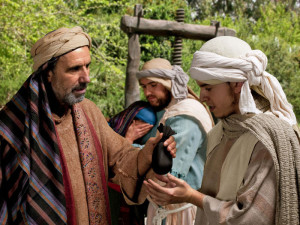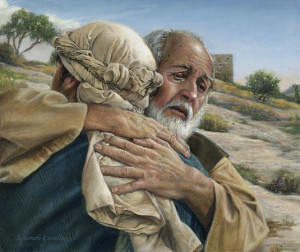In the New Testament, Jesus tells us again and again that He is completely reliant on the Father and can do nothing on His own. In spiritual terms a fatherly relationship is a necessary requisite to understand our personal relationship with our Father in Heaven.
The Basic Human Need for Father-Son Relationships
 One of the great needs among men in the world is the desire to be blessed by their own fathers. Millions of men throughout the world suffer in silence because they feel their fathers rejected them, or that for some known or unknown reason, relationships with their fathers were adversarial and unpleasant. They never received their father’s blessing or acknowledgment. Psychologists have labeled this deep seated emotional need among men as “father-hunger.”
One of the great needs among men in the world is the desire to be blessed by their own fathers. Millions of men throughout the world suffer in silence because they feel their fathers rejected them, or that for some known or unknown reason, relationships with their fathers were adversarial and unpleasant. They never received their father’s blessing or acknowledgment. Psychologists have labeled this deep seated emotional need among men as “father-hunger.”
A popular idiomatic expression used by fathers with young sons is “Sticks and stones may break my bones, but words will never hurt me.” This phrase is applied when the son’s feelings are hurt at school with name calling by bullies, and to emphasize that words are not a physical threat. Fathers want their sons to “toughen up “and learn to hide their feelings so they can ignore the taunting words of bullies. It is only a temporary Band-Aid for a life lesson. As the son matures the son must unlearn to hide his feelings in appropriate situations so he can develop intimacy in relationships.
The Power of Our Words
Words shape the way we look at the world, and they also affect our actions. Words can inspire, but most any adult will acknowledge that inflammatory or inappropriate words can offend, and have very real world rewards and consequences in all aspects of adult life. Even scripture (see Proverbs 15:1) warns us of the consequence of using our words unwisely.
Fathers and Sons – The Parable of the Prodigal Son
 Traditionally, when discussing scripture and gospel perspectives on the subject of father/son relationships our thoughts turn to the parable of the Prodigal Son (Luke 15:11-32). Here we are told of a father with two sons. The younger son comes to him “Father, give me the portion of goods that falleth to me.” The father then divides up his living and grants the son his request.
Traditionally, when discussing scripture and gospel perspectives on the subject of father/son relationships our thoughts turn to the parable of the Prodigal Son (Luke 15:11-32). Here we are told of a father with two sons. The younger son comes to him “Father, give me the portion of goods that falleth to me.” The father then divides up his living and grants the son his request.
Initially, we can rightfully interpret the parable to demonstrate that even when we greatly err, God will have such great love and compassion for us that no matter what we do, He will still love us, and will show mercy and compassion toward us.
Many books have been written on this subject offering various perspectives and interpretations. French Philosopher Jean Luc Marion offers an alternate interpretation in his book “God Without Being.” Drawing from the Greek biblical text of the story, he states that the Greek version implies the son asked for much more than just property and money. The word used is “ousia,” the translation of which is roughly “substance.”
The son, as an heir to the father, already has access to what is rightfully his. However, he wants to disassociate himself from his father and become his own man. He wants unfettered freedom to do as he pleases, and not to have to acknowledge the source or gift of his father.
Modern-day Revelation Sheds Light on the Parable of the Prodigal Son
In the early days of The Church of Jesus Christ of Latter-day Saints, the Prophet Joseph Smith and others are said to have received revelation directly from the Lord. Mormons believe God speaks to us today, just as He did to His children anciently.
These revelations were collected and compiled into a book called the Doctrine & Covenants. Mormons accept the KJV Bible, Book of Mormon, Doctrine and Covenants, and a small book called the Pearl of Great Price as scriptural cannon. Each goes hand in hand with the other to clarify gospel principles, especially when there are vague or uncertain interpretations of scripture. These additional revelations from the Lord, combined with prayer and the direction of the Holy Spirit, give greater clarity and understanding of scripture and gospel teaching and principles.
 Collectively, these books are the validation and witness of the principles and teachings of the fullness of the Gospel in the modern or latter day. Mormons refer to the collection of these books as “the Standard Works.” The Doctrine and Covenants is divided into sections and then scriptural verses. In Doctrine and Covenants 88:33, we read, “For what doth it profit a man if a gift is bestowed upon him, and he receive not the gift? Behold, he rejoices not in that which is given unto him, neither rejoices in him who is the giver of the gift.”
Collectively, these books are the validation and witness of the principles and teachings of the fullness of the Gospel in the modern or latter day. Mormons refer to the collection of these books as “the Standard Works.” The Doctrine and Covenants is divided into sections and then scriptural verses. In Doctrine and Covenants 88:33, we read, “For what doth it profit a man if a gift is bestowed upon him, and he receive not the gift? Behold, he rejoices not in that which is given unto him, neither rejoices in him who is the giver of the gift.”
This Mormon scripture parallels the thinking of many theological scholars with regard to the Parable of the Prodigal Son. These scholars suggest that when a gift is no longer sensed and acknowledged it leads to misuse. In the Parable of the Prodigal Son, the “ousia” (substance or gift), becomes the property of the son without him having to acknowledge the source as his father. It is his alone – made possible because the father has allowed him to disassociate himself without recognition of the source. Therefore, in a sense, the son has annulled his relationship and acknowledgment of his father.
The Prodigal Son Returns
 According to Marion, what the prodigal son really wanted was something more than his worldly goods. He wanted a type of independence that was incorrect. The errant son sought an unfettered and ungrateful independence. In so seeking, he lost much of the genuine and worthwhile aspects of life, including his integrity, and finally his freedom. What the son thought was freedom, was lost because he rejected the possibility of acknowledgment and his relationship with the source which was his father.
According to Marion, what the prodigal son really wanted was something more than his worldly goods. He wanted a type of independence that was incorrect. The errant son sought an unfettered and ungrateful independence. In so seeking, he lost much of the genuine and worthwhile aspects of life, including his integrity, and finally his freedom. What the son thought was freedom, was lost because he rejected the possibility of acknowledgment and his relationship with the source which was his father.
Eventually, the son finds himself in dire circumstances. He realizes that even the lowest servant in his father’s household at least has bread (the staff of life). The errant son is humiliated, but recognizes his folly. He now gathers resolve to re- acknowledge his father as the source of his ousia, hoping that his father will at the least grant him servitude. He had intentionally put himself outside of his father’s circle of acknowledgement with his own inappropriate actions. The father in the parable cannot restore the lost goods or expended time, but he can restore the wayward son’s dignity, even though it is painful for the older and more faithful son to witness and understand. Thus, it is only a partial redemption, but an important one.
Repairing the Breach
In the telling of the Parable of the Prodigal Son, Christ illustrates in a beautiful way our own need to acknowledge the source of our “ousia,” and the importance of having a desire to do and act in harmony with the will of our Father in Heaven.
 It is important to note that the characters in the Parable of the Prodigal Son are ideal. When a relationship breach occurs between father and son, both must work to resolve the issues. Notwithstanding, many fathers and sons are not ideal characters like those portrayed in the parable. We must be aware that there are also external antagonists – like the angry faithful son – who reject a restoration of dignity and who attempt to sabotage a re-acknowledgement. Once we have done all we can do personally to repair the father-son relationship, these outside antagonists can influence our ability to heal a breach, making the breach mortally intractable. It is not just about us, or our willingness to heal, but others may also play a determining role.
It is important to note that the characters in the Parable of the Prodigal Son are ideal. When a relationship breach occurs between father and son, both must work to resolve the issues. Notwithstanding, many fathers and sons are not ideal characters like those portrayed in the parable. We must be aware that there are also external antagonists – like the angry faithful son – who reject a restoration of dignity and who attempt to sabotage a re-acknowledgement. Once we have done all we can do personally to repair the father-son relationship, these outside antagonists can influence our ability to heal a breach, making the breach mortally intractable. It is not just about us, or our willingness to heal, but others may also play a determining role.
Mormons believe that families are the building blocks of eternity. With this understanding, familial relations, including those of fathers and sons, must be repaired in the eternities as part of God’s Plan of Salvation. God will be the ultimate judge of our sincerity, repentance, and willingness to heal. An angry heart cannot heal. This is the reason we must go to great lengths to forgive one another.
 Most of these wounded sons eventually become fathers and husbands. They, over time, recognize and analyze how their personal rejection by their fathers (not really ever being able to “measure-up”) affected their lives. These heroic individuals, who are wounded emotionally and spiritually, resolve that they will not be a source of wounds to their children and wives. These men seek to ensure their sons hear and experience their acceptance. Had they been given, or received, such a simple and sincere approbation from their fathers, it would have literally changed their lives.
Most of these wounded sons eventually become fathers and husbands. They, over time, recognize and analyze how their personal rejection by their fathers (not really ever being able to “measure-up”) affected their lives. These heroic individuals, who are wounded emotionally and spiritually, resolve that they will not be a source of wounds to their children and wives. These men seek to ensure their sons hear and experience their acceptance. Had they been given, or received, such a simple and sincere approbation from their fathers, it would have literally changed their lives.
Likewise we sometimes hear the phrase, “…actions speak louder than words.” Actions and words together cement our relationships. The lack of one, or the other, can result in an adverse effect. Silent approval through deeds (action) cannot substitute for verbal approbation. It is surprising that just telling our children how much we love them and being proud of their accomplishments can make all the difference in their lives.
In Proverbs 22:6, the Lord tells us that parents are responsible to teach their children about Him, and to follow His commandments in both word and deed. This scripture reinforces the need for verbal approval as well as a demonstrative deed or action. Let us follow the example of Christ and our Father in Heaven and acknowledge our sons (and daughters too).
This article was written by Mel Borup Chandler.
 Mel is a guest editorialist for the Deseret News and the More Good Foundation. Many of his religious articles have been translated into multiple languages. He and his wife Sandra live in California. Mel was also a former LDS missionary in Argentina.
Mel is a guest editorialist for the Deseret News and the More Good Foundation. Many of his religious articles have been translated into multiple languages. He and his wife Sandra live in California. Mel was also a former LDS missionary in Argentina.
